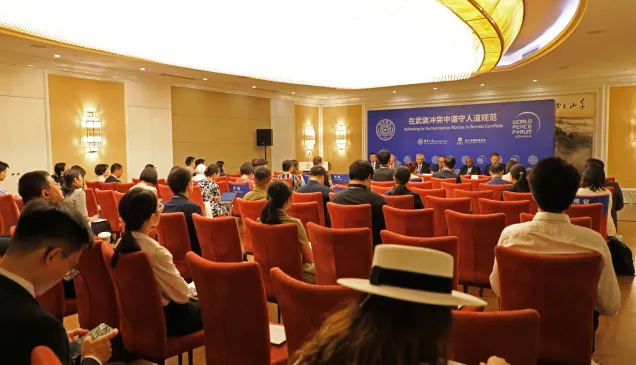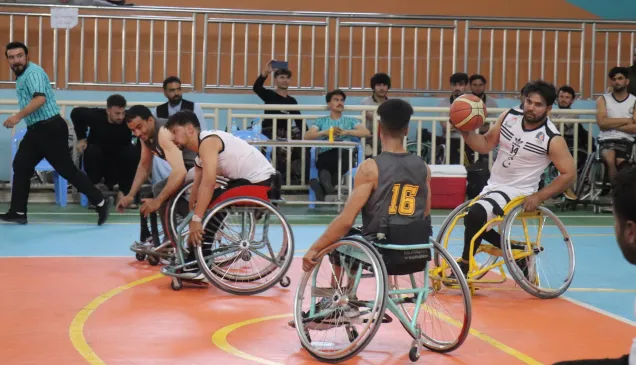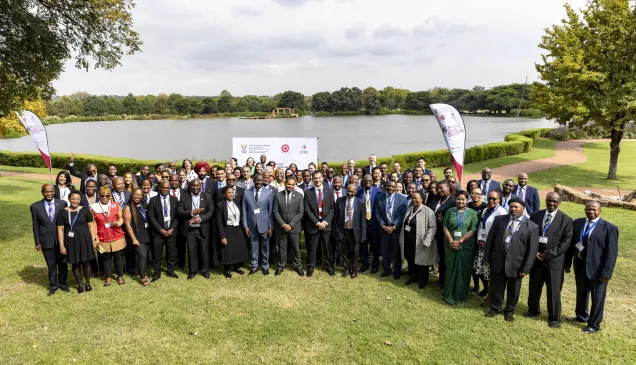Australia: Perspectives from an ICRC surgeon
ICRC medical adviser Dr Robin Coupland visited Australia recently to attend the World Medical Association's Global Health Summit. During his visit, we talked to him about his long career as an ICRC surgeon and perspectives on challenges to global health care.
We know that one of the biggest challenges to global health care is ongoing violence against health care personnel and patients in contexts of conflict and emergencies. Why are we mobilizing Australian medics on this issue?
The Health Care in Danger (HCiD) project, which is addressing violence against health care in conflicts and emergencies, is based on public health principles; in other words, security is a prerequisite for health care. Australia has a very strong public health tradition, so the health-care community here is an important one for us to influence on this issue. The HCiD project has thrown up some very interesting issues related to things such as medical ethics, so it's important that health-care institutions such as the Australian Medical Association (AMA), which influence practice and medical ethics, are involved in the project's efforts to reach a global agreement on medical practice in contexts of conflict. Another reason we are promoting this issue here is because the Australia's military personnel as well as aid workers who deploy overseas for Australian Red Cross and other humanitarian organisations of course need to be aware of the many different issues related to health care in armed conflict and emergencies.
The use of explosive weapons in densely populated areas is just one of the issues of serious concern to the ICRC at the moment. Can you tell us about the health impacts related to the use of these types of weapons in urban areas?
This is a phenomenon that defines the 20th century and yet up until now it's proved to be a very difficult issue in the context of applying international humanitarian law. We can view the impacts of explosive weapons in urban areas in a number of different ways. The easiest way is to look at the deaths and injuries amongst the civilian population affected. But we must not overlook the significant psychological impacts and stress factors that can remain with people for months or even years because they were near the explosions. Another thing that's often not considered is the long-lasting impact of these explosive weapons on the physical infrastructure of towns and cities where they are deployed, and the ongoing impact on communities living amongst this damage. The overall health of communities is very easily disrupted by explosive weapons being used. Having lived and worked in urban areas, such as Kabul and Mogadishu, which have come under bombardment, this is an issue that is very close to my heart and why at a personal level I think it's an important subject for the ICRC.
Why is it crucial for governments, such as Australia, to scrutinize the potential impacts of new weapons, in particular health-related considerations?
A government that is thinking about purchasing, developing or deploying a new weapon has many things to consider such as how that weapon might be used, and what advantage it might bring. And our message, above all, is that a government has to consider the impact of that weapon on an individual or at a community level. It comes back to the fundamental principle of IHL that the military advantage has to be balanced against the human cost of any means or methods of warfare. A very important example in this domain was in the mid-1990s when a number of governments showed interest in laser technology to develop blinding weapons. The ICRC was at the forefront of pointing out the implications for the lives of soldiers who suffered from immediate blindness and what that meant for them and their families. The countries concerned hadn't considered that these same weapons might one day be used against them and they would have to bear the social cost of blinded soldiers returning home.
What are some practical or ethical issues budding ICRC surgeons should be prepared to face in situations of conflict or disaster?
There are three elements of ICRC surgical practice that any new surgeon has to accommodate. First, a hallmark of the contexts in which ICRC operates is that there are rarely specialists available; in other words the ICRC surgeon is expected to do everything. Second, there is a tendency to have a much more basic level of medical technology. Thirdly, there are usually no major trauma centres (as you would have in a country like Australia) in the contexts where ICRC works. This means that a patient's surgical treatment is the ICRC surgeon's responsibility from beginning to the end; there's nowhere else they can go. The main issue for a new surgeon is basically how to adapt to those three elements, especially when they may have to practise surgery outside their specialist comfort zone, in situations when they are the only pair of surgical hands available. In terms of ethical challenges, as health care advances, there are increasing issues around the practice of medicine, especially surgery, within a domain that the practitioner is not familiar.
You also have to take into account the different communities and the culture. The question of quality of care can be very important for the ICRC and for the security of the health-care personnel. That links to issues such as whether people understand surgical procedures, whether they can give consent, whether they actually know what it means, for example, to have an amputation. An intellectual challenge for a surgeon is to integrate well-known notions of correct surgical practice into a completely different context, where the acceptance of the organisation - and maybe even the security of the team - depends on that surgical care being accepted in that context.
What other advice do you have for Australians looking to start a career in surgery with ICRC? Can you share some lessons learnt?
One of the biggest lessons I have learnt in my career is to be humble and to listen to the advice of not only your surgical colleagues but also nurses, especially the head nurse, in a hospital. A successful surgical mission is usually much more to do with the attitude of the surgeon rather than whether he or she is brilliant as a technical operator. Within your surgical training, touch on as many different surgical specialities as possible. The other piece of advice that I would give is to look at a surgical mission not just as an opportunity to provide surgical care to people. Part of your objective should also be to consider what you can bring back from that mission – either as teaching points, gathering data, or writing up an article on your experience. It's a great opportunity to let your colleagues back home know the reality of the conflict situation in which you've been working. It's also important to stress that although you occasionally have difficult and dangerous days, they are in fact very few and far between. Normally being in the field with ICRC is similar to working in a small district hospital in Australia, but the people who are coming in happen to be wounded by weapons. Obviously if things get really difficult and dangerous then you have to suspend activities or sometimes close down a hospital, but these are the situations we try to avoid.



